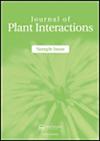磷酸蛋白质组分析揭示壳聚糖诱导水稻幼苗对渗透胁迫的抗性
IF 3.3
3区 生物学
Q2 PLANT SCIENCES
引用次数: 3
摘要
摘要本研究试图在翻译后水平上确定对壳聚糖反应的潜在机制。Khao Dawk Mali 105颗种子浸泡在40颗种子中 mg l−1的壳聚糖,以及2周龄和4周龄幼苗的叶片在开始渗透胁迫条件之前用壳聚糖喷洒。壳聚糖通过提高地上部鲜重和干重来诱导对渗透胁迫的抗性,并保持增加的光合色素。使用无凝胶LC-MS/MS检测叶片磷酸化蛋白质组。在用壳聚糖处理的渗透胁迫植物中,60种磷蛋白的蛋白质表达存在显著差异。40%以上的磷蛋白参与信号通路,包括OsCML12钙调蛋白相关的钙传感器蛋白、泛素羧基末端水解酶15、含U-box结构域的蛋白45、HEAT重复家族蛋白、含BRCA1 C末端结构域的蛋白质、果胶酯酶、含蛋白激酶结构域的蛋白酶和受体样蛋白激酶。壳聚糖通过渗透胁迫下的代谢、转运、转录和信号传导等多种复杂网络增强水稻幼苗生长和抗旱性。本文章由计算机程序翻译,如有差异,请以英文原文为准。
Phosphoproteome analysis reveals chitosan-induced resistance to osmotic stress in rice (Oryza sativa L.) seedlings
ABSTRACT This study sought to identify the mechanism underlying the response to chitosan at the posttranslational level. Khao Dawk Mali 105 seeds were soaked in 40 mg l−1 of chitosan, and leaves of 2- and 4-week-old seedlings were sprayed with chitosan before starting osmotic stress conditions. Chitosan induced resistance to osmotic stress by enhancing shoot fresh and dry weights and maintained increased photosynthetic pigments. Leaf phosphoproteomes were examined using gel-free LC-MS/MS. Of the 60 phosphoproteins showed a significant difference in protein expressions under osmotically-stressed plants treated with chitosan. More than 40% of the phosphoproteins involved in signaling pathways, including OsCML12 calmodulin-related calcium sensor protein, ubiquitin carboxyl-terminal hydrolase 15, U-box domain-containing protein 45, HEAT repeat family protein, BRCA1 C terminus domain-containing protein, pectinesterase, protein kinase domain-containing protein, and receptor-like protein kinase. Chitosan enhanced rice seedling growth and drought resistance via multiple complex networks, including metabolism, transport, transcription, and signaling under osmotic stress.
求助全文
通过发布文献求助,成功后即可免费获取论文全文。
去求助
来源期刊

Journal of Plant Interactions
PLANT SCIENCES-
CiteScore
5.30
自引率
6.20%
发文量
69
审稿时长
>12 weeks
期刊介绍:
Journal of Plant Interactions aims to represent a common platform for those scientists interested in publishing and reading research articles in the field of plant interactions and will cover most plant interactions with the surrounding environment.
 求助内容:
求助内容: 应助结果提醒方式:
应助结果提醒方式:


